Fountain Paint Pot Trail
in Yellowstone National Park

Yellowstone National Park has several hydrothermal areas, so what makes the Fountain Paint Pot Area worth visiting? For starters, this part of Lower Geyser Basin has all four of the hydrothermal features found in the park (mudpots, geysers, hot springs, and fumaroles) and you can see them all from a compact half-mile long boardwalk loop. While none of the many Fountain Paint Pot Area geysers are as famous as Old Faithful, they erupt so frequently that you are almost guaranteed a great show on your short hike.
Since the walkway passes all four of Yellowstone’s hydrothermal formations, the hike comes with a guaranteed lesson in hydrothermal volcanism. A geyser is formed when water collecting below the surface is heated by a magma source. When the water boils, it rises to the surface. If the water has an unobstructed path, it will pool on the surface in the form of a steaming hot springs. If the passage of the water is imposed upon, the pressure will increase. When the pressure becomes too great, the water converts into to steam. Steam takes up 1,500 times the volume of water, and at this point, the pressure becomes so intense that the steam and surrounding water droplets shoot out of the ground in geyser form, erupting until the pressure has abated and the process starts all over again.
A fumarole is like a geyser without all the water. Gas and steam escape through vents in the surface and can sounds like roaring bellows. Fumaroles are the driest hydrothermal feature. The second driest are the mudpots, which have less water than hot springs, but more than fumaroles. At Yellowstone, hydrogen sulfide gas that is emitted from underground sources becomes sulfuric acid and breaks down the surrounding stone into grey clay. The muddy pools bulge and burst in an entertaining display as gas bubbles erupt on the surface. Mud can spit several feet into the air and even end up on the boardwalk.
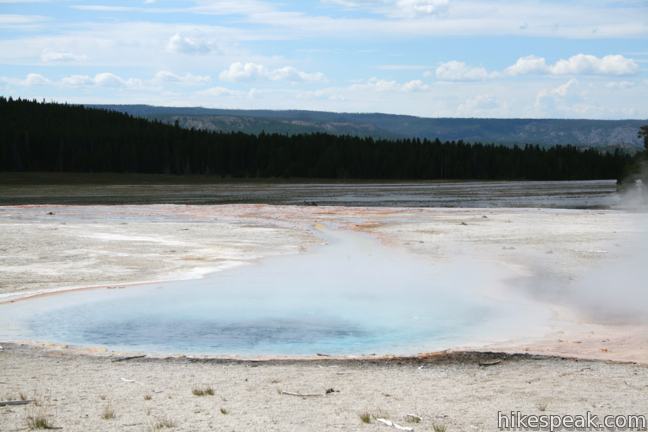
Fountain Paint Pot Trail has several named features. The first you will see is Celestine Spring, on the left as you walk from the parking area to the start of the loop. This deep blue pool is far less turbulent than the features just ahead, and a relaxing sight. Upon reaching the loop, you can head in two directions. Head left to reach a collection of geysers or continue straight toward mudpots and fumaroles.
Hiking the loop in a clockwise direction, you will first pass through a forest of lodgepole pine snags that were drowned and left lifeless by the surrounding hot springs. As you approach the northwest end of the loop, you will spot a lively collection of geysers. Clepsydra Geyser, Fountain Geyser, Jelly Geyser, Jet Geyser, Morning Geyser, Spasm Geyser, and Twig Geyser erupt with various levels of regularity.
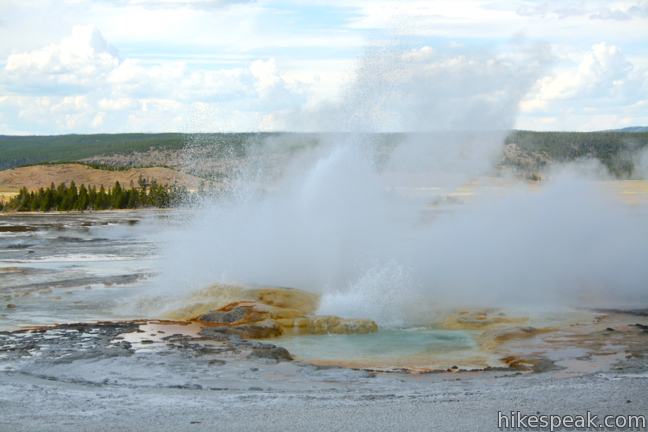
Clepysdra Geyser erupts almost persistently. It only seems to take a break when its neighbors are erupting. Morning Geyser has the opposite personality and erupts very rarely. If you are lucky enough to see it in action, expect bursts of up to 200 feet tall and 100 feet wide. The trail guide describes Fountain Geyser as one of Yellowstone’s most impressive geysers when it erupts, with 50-foot bursts that can last half an hour.
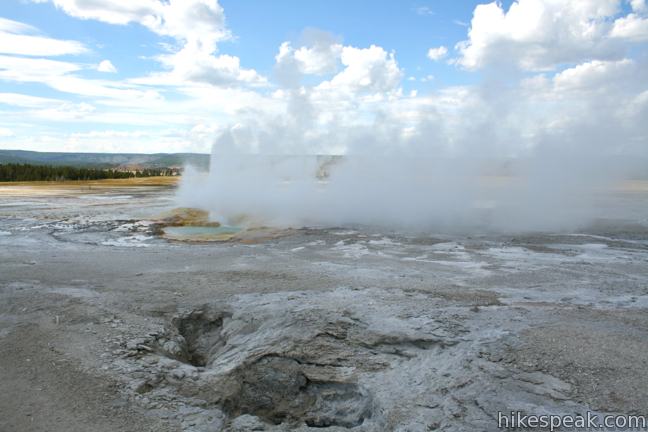
As you progress around the walkway toward the northeast corner, you will pass Red Spouter, which behaves like a fumarole, a hot spring, and a mudpot throughout the year. It is like a hot spring in the winter, a muddy reddish pool in the spring and a steaming fumarole in the drier summer and fall. Wrapping down the east side of the boardwalk, you will pass Leather Pool and a slope of fumaroles. These gaps in the surface whistle and hiss as gasses and steam escape from the ground. Just below the fumaroles, where a little more water is present, the trail circles Fountain Paint Pot. These mudpots bubble and pop as globs of mud springs from the surface like miniature trapeze artists.
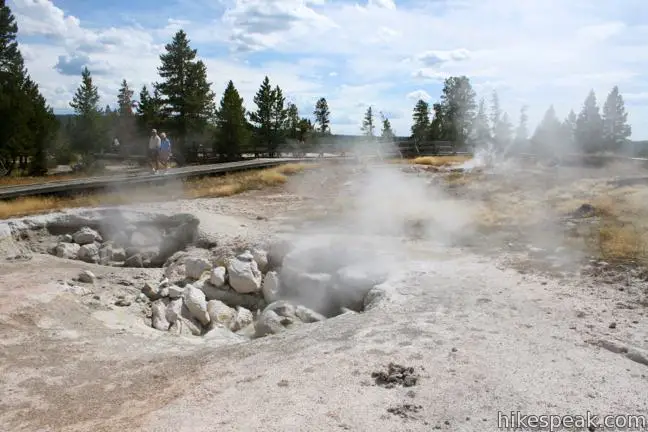

Continuing downhill, the hydrothermal features become even wetter as you arrive at Silex Spring. Look down into the small blue pool rimmed with white silica. Water spills over the sides of the spring creating an orange-colored surface covered in rippling runoff. These colors are created by thermophiles, heat-loving microorganisms that live in Yellowstone’s hot springs.
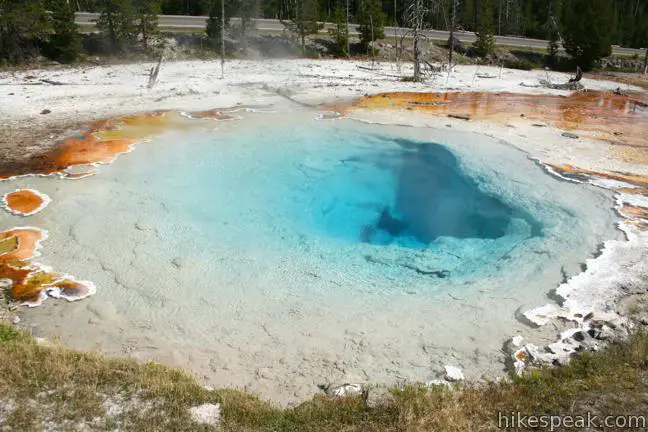
The loop comes to a close just below Silex Spring, where it is just a short walk back to the parking lot. Fountain Paint Pots Trail has no trail junctions, so take in the hydrothermal features without any concern of getting lost. Set aside 15 minutes to explore the Fountain Paint Pot Area of Lower Geyser Basin.
Yellowstone National Park has an entrance fee, but no permit is required to hike Fountain Paint Pot Trail. Stay on the boardwalk and do not touch any hydrothermal features (or throw anything in).
To get to the trailhead: From Old Faithful, drive 8.5 miles north on Grand Loop Road (Route 89) to Lower Geyser Basin and turn left (west) into the parking area for Fountain Paint Pot Trail, which is across from Firehole Lake Drive. From the other directions, drive 8 miles south of Madison Junction on Grand Loop Road to reach the trailhead.
Trailhead address: Grand Loop Road (Route 89), Yellowstone National Park, WY 82190
Trailhead coordinates: 44.548546, -110.807223 (44° 32′ 54.76″N 110° 48′ 26.00″W)
You may also view a regional map of surrounding Wyoming trails and campgrounds.
 | Midway Geyser Basin This 0.8 mile walkway passes Excelsior Geyser and Grand Prismatic Spring, the largest hot springs in Yellowstone. |
 | Biscuit Basin This 2/3 of a mile loop explores hydrothermal features in Upper Geyser Basin like Black Opal Pool, Sapphire Pool, and Black Pearl Geyser. |
 | Old Faithful Geyser The tall, frequent eruptions of Yellowstone's most famous geyser have been dazzling visitors for over a century and are easy to witness today. |
 | Monument Geyser Basin This 2.8-mile hike reaches a rarely visited hydrothermal area that is boardwalk-free and fun to explore. |
 | Artists' Paintpots This 1.1-mile hike circles a hillside hydrothermal area, passing bursting mudpots, bubbling hot springs, and mesmerizing milky blue pools. |
 | Back Basin of Norris Geyser Basin This loop passes Steamboat Spring, the world's largest geyser, and several other hydrothermal features. |
 | Porcelain Basin of Norris Geyser Basin This pair of loops explores a stark basin with an impressive collection of geysers and hot springs. |
 | More trails in Yellowstone Explore other hikes to waterfalls and hydrothermal hot spots in Yellowstone National Park. |
 | Yellowstone National Park Campgrounds Twlve developed campgrounds with over 2,000 total sites are spread throughout Yellowstone. |















I would like brochures we are leaving October 10, 2017